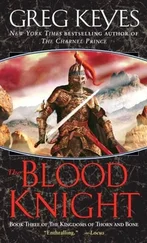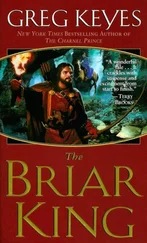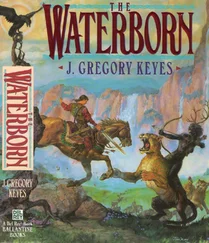Gregory Keyes - The Charnel Prince
Здесь есть возможность читать онлайн «Gregory Keyes - The Charnel Prince» весь текст электронной книги совершенно бесплатно (целиком полную версию без сокращений). В некоторых случаях можно слушать аудио, скачать через торрент в формате fb2 и присутствует краткое содержание. Жанр: Фэнтези, на английском языке. Описание произведения, (предисловие) а так же отзывы посетителей доступны на портале библиотеки ЛибКат.
- Название:The Charnel Prince
- Автор:
- Жанр:
- Год:неизвестен
- ISBN:нет данных
- Рейтинг книги:5 / 5. Голосов: 1
-
Избранное:Добавить в избранное
- Отзывы:
-
Ваша оценка:
- 100
- 1
- 2
- 3
- 4
- 5
The Charnel Prince: краткое содержание, описание и аннотация
Предлагаем к чтению аннотацию, описание, краткое содержание или предисловие (зависит от того, что написал сам автор книги «The Charnel Prince»). Если вы не нашли необходимую информацию о книге — напишите в комментариях, мы постараемся отыскать её.
The Charnel Prince — читать онлайн бесплатно полную книгу (весь текст) целиком
Ниже представлен текст книги, разбитый по страницам. Система сохранения места последней прочитанной страницы, позволяет с удобством читать онлайн бесплатно книгу «The Charnel Prince», без необходимости каждый раз заново искать на чём Вы остановились. Поставьте закладку, и сможете в любой момент перейти на страницу, на которой закончили чтение.
Интервал:
Закладка:
He jumped on the downbeat. His legs jerked when he did it, and he nearly didn’t make it, but one hand caught the wooden latticework of the windsail. Without warning he found himself turning upside-down, but he managed to claw his other hand into the fabric. His stomach churned with fear and disorientation as the landscape retreated impossibly far below him. Then it was rushing back at him again, and he started climbing down the vane.
As it dipped near the ground, he hastened his pace, fearing to make another rotation, but it was still too far away. He clung tight as his perch swung up again, and oddly enough, his fear began to turn into a sort of exhilaration. His head was toward the axis now, and something seemed to be tugging at his feet, even when his feet were pointed toward the sky, as if the saints didn’t want him to fall. He went with the tug, climbing on even while upside-down, and when next the vane moved earthward, he was low enough to drop.
He hit the ground hard, but not breaking hard, and lay there in the grass for a moment.
But not for long. Keeping low, he moved away from the burning malend and toward the canal. He had almost reached it when a strong hand gripped his arm.
“Ssh!” a low voice commanded. “Quiet. It’s just me, Gilmer.”
Leoff closed his eyes and nodded, hoping his heart would not explode through his breastbone.
“Follow,” Gilmer said. “We’ve got to get away from here. The men who did this—”
“I saw them, on the other side of the malend.”
“Auy. Stupid, they are.”
“Well, there are no windows on this side to watch.” They reached the canal. Leoff saw that a small rowboat was moored there.
“Quickly,” Gilmer said, untying the rope. “Get in.” Only a few moments later they were out in the center of the canal, with Leoff pulling on the oars as hard as he could. Gilmer had taken the tiller.
“I was afraid you were dead,” Leoff said.
“Nay. I’d stepped outside to watch her turn. Heard ‘em come in and what they were talking about. I didn’t reckon I could stop ‘em.” He looked back at the malend. Flames were bursting from the top, and the windsails had caught like torches. They were still turning. “Sorry, love,” Gilmer said softly. “Rot ‘em for doing that to you. Rot ‘em.” Then he turned away.
“What now?” Leoff asked.
“Now we go to Broogh and see what mischief is goin’ on there.”
“But Artwair didn’t come back.”
“Then he may need our help.”
It seemed to Leoff that any trouble Artwair couldn’t get himself out of was likely to be far too much for the likes of a composer and a windsmith. He started to say as much, but then another thought occurred. Gilmer must have seen it on his face. “What?” the old man asked.
“My instruments. My things!”
The old man nodded sadly. “Auy. We’ve both lost today. Now think about what those folk down there will lose if these villains break the dike.”
“I just wonder what we can do. I can’t fight. I know nothing of weapons.”
“Well, me neither,” Gilmer replied, “but that doesn’t mean I’ll just let it happen.”
As if mourning the malend, the wind dropped, and stillness settled on the canal, broken only by the liquid pull of oars through water. Leoff watched the banks anxiously, fearing that the men might be following them along it, but nothing stirred through the stately silhouettes of the elms that bordered the waterway.
Soon the trees were joined by larger shadows—cottages at first, then tall buildings. The canal narrowed.
“The gate is ahead,” Gilmer whispered. “Be ready.”
“For what?” Leoff asked.
“I’ve no cann,” the elder man said.
The Watergate was a simple one made of wrought iron, and it was open. They passed almost noiselessly through it and into the town of Broogh.
The strange silence of the night was thicker there than it had been farther down the canal, as if Broogh were the very heart of the stillness. Neither did the faintest candle illumine the windows. They were filmed with moonlight like the eyes of the blind.
Quietly, Gilmer guided the small boat to a quay.
“You first,” he told Leoff. “Careful not to rock me.”
Leoff stepped gingerly from the boat and onto the stone landing, and a shiver ran up his spine as his feet touched solid ground.
Artwair had been right—something was terribly wrong here.
“Hold her steady for me,” Gilmer said. “Be useful, auy?”
“Sorry,” Leoff whispered. Even his faint reply seemed to echo in the silent town. He held the edge of the boat while the windsmith tied her off, feeling the pulse in his throat.
Broogh was beautiful, cloaked in moonlight. The tall, narrow buildings were leafed in silver, and the cobbles of the streets seemed liquid while the waters of the canal had become a sheet of mica. The bridge that must have given the town its name arched strong and elegant a few paces away, a saint sleeping in stone at each pillar. Beyond, across and down the canal, rose the bell tower of the church.
Just next to him, on the street parallel to the canal, a wooden sign was barely readable in faint light. It proclaimed the door beneath as the entrance to the paiter’s fatem. Beneath the words was a small wooden bas-relief of a fat sacritor filling a cup from a cask of wine.
When Gilmer finished with the boat, he pointed at the Paiter’s Fatem. “There,” he said. “That’s the busiest tavern in town, and it should be awful busy right now.”
Like every other building in Broogh, it was quiet and dark.
“We’ll have a look inside,” Gilmer murmured. “If everyone is hiding, you can bet half the town is hiding in there. In the cellar, maybe.”
“Hiding from what? A few rascals like the ones who burned your windmill?”
“No,” Gilmer said. “Broogh has a reputation.”
“What do you mean?”
“Evildoers have sought out this town in the past. Its location is perfect—break the dike here, and the water won’t stop for sixty leagues. It’s been tried. Thirty years ago, a renegade Hansan knight—Sir Remismund fram Wulthaurp—came here with twenty horse and a hundred foot. He installed himself in this very inn and sent letters to Eslen, threatenin’ to open the waters unless he was given ransom.”
“But he didn’t?”
“Nay. A girl, the daughter of a boatwright, the fairest in town, was to be married the next day. She put on her weddin’ gown and went to Wulthaurp, up there, in that topmost apartment. She kissed him, and as they kissed, there, near that window, she wound the train of her dress about his neck and threw herself from the buildin’. They made a bloody mess almost where you’re standin’. At that signal, the rest of the folk turned against his men. The army had to fight its way out the gate, leaving nearly a hundred Brooghers dead in the streets.” He shook his head. “Nor was that the first time such a thing has happened. No, every boy and girl who grows up in Broogh thinks of the dike and the bridge as a holy trust. They all yearn to be the hero of the next story.”
“And yet you think something has frightened them into hiding?”
Gilmer shook his head. “No,” he said sadly, “I fear they’re nay hidin’ at all.”
The door opened with no more protest than a faint creak, but their entry drew no response. Muttering to himself, Gilmer took out his tinderbox and struck light to a candle.
“Holy saints!” Leoff gasped, when the light fell about them.
There were indeed a lot of people in the Paiter’s Fatem, or what had once been people. They lay or slumped in groups, unmoving. Leoff had no doubt whatever that they were dead. Even in the warm light of fire, their flesh was whiter than bone.
Читать дальшеИнтервал:
Закладка:
Похожие книги на «The Charnel Prince»
Представляем Вашему вниманию похожие книги на «The Charnel Prince» списком для выбора. Мы отобрали схожую по названию и смыслу литературу в надежде предоставить читателям больше вариантов отыскать новые, интересные, ещё непрочитанные произведения.
Обсуждение, отзывы о книге «The Charnel Prince» и просто собственные мнения читателей. Оставьте ваши комментарии, напишите, что Вы думаете о произведении, его смысле или главных героях. Укажите что конкретно понравилось, а что нет, и почему Вы так считаете.












